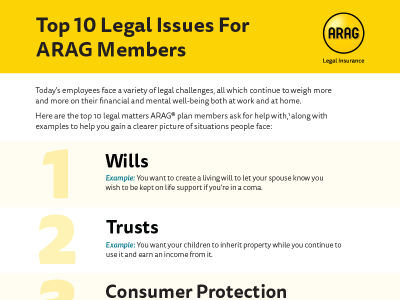So you just received the official notice that you’re being sued. While this can be a stressful time, there are a few steps you can take to ease the tension. Take a deep breath, don’t panic and read on to learn what to do next.
1. Find out how long you have to respond to the suit.
When someone gives you notice – a summons and complaint - it’s time to get to work. A summons notifies you of the lawsuit, while the complaint lists the specific allegations or claims the plaintiff is making against you. Ignoring it won’t make the legal matter go away. Depending on the state, you’ll have a set number of days to respond. Typically, this is around a few weeks. It’s important that you contact an attorney right away and not wait until a few days before your answer is due.
2. Compile and preserve all your evidence.
Take some time to get organized and collect all your evidence. This can include several things, such as:
- Letters
- Contracts
- Payment records
- Emails
- Voicemails
- Texts
- Photos and videos
- Spreadsheets
- Social media interactions
It’s important that you don’t accidentally, or intentionally, destroy any evidence – this could result in more legal penalties. Once you talk with your lawyer, they will advise you on the information and documents you’ll need to collect.
3. Discuss your options with a lawyer.
When you’re served with a lawsuit, you have a few options in responding. You must file an answer – if you don’t, you will be found in default. You can answer the lawsuit by either admitting, denying or partially admitting and denying the claims. Another option is to countersue if you think you have a claim against them. You could file a motion to dismiss the lawsuit on a variety of grounds, such as you don't believe the claims are valid, you weren't served properly or improper venue. You should file a motion to dismiss before filing your Answer. The court will review your motion and either grant or deny your motion to dismiss. Your attorney may also suggest trying to settle the matter.
4. Take the next step.
Depending on how you decide to proceed, there are several outcomes. If you answer the lawsuit or countersued, you will enter the discovery phase of the lawsuit, which involves the parties gathering and exchanging information, documents and evidence and preparing for trial. The laws vary by state, so you will either represent yourself or you can choose to have a lawyer represent you in court. To “win” your case, you will have to convince the judge or jury that your version of the story is the true one. You may consider filing a motion for summary judgment asking the court to rule there is no "dispute of material fact" so there is no need to go to trial, ending the lawsuit. If the motion is denied, then the case proceeds to trial. Finally, if you decide to settle the lawsuit outside of court, you and the other party will meet to compromise on a solution, prepare a settlement agreement and inform the court the lawsuit has settled.
If you’re an ARAG member, working with a network attorney is a great first step to take. They can provide guidance on your options and how to best proceed. Always remember to check out your county and state’s website to learn more about the specific laws regulating lawsuits where you live.



